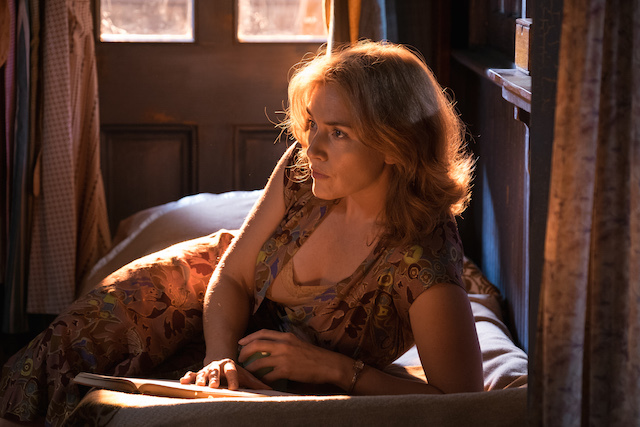
Woody Allen’s Wonder Wheel tells us how to watch it right away. “As a poet, I use symbols,” says our narrator, Coney Island lifeguard Mickey (Justin Timberlake). “And as a budding dramatist, I relish melodrama and larger-than-life characters.”
In that sense, the film is really a play—albeit one with gorgeous cinematography and high production values. It’s an ode, of sorts, to those 1940s and 50s dramatists—Tennessee Williams, Arthur Miller, Eugene O’Neill—with their smart melodramas filled with archetypal characters, boiling over tensions, and broken dreams.
The film’s set is Coney Island, where salt-of-the-earth everyman Humpty (Jim Belushi) manages the merry-go-round. His wife, Ginny (Kate Winslet) works at the local clam bar and often complains of migraines. At one point, Ginny was an actress, but she got married, had a son (Jack Gore), briefly betrayed her first husband, resulting in a divorce, and was “saved” by Humpty. She doesn’t love him, but she’s grateful to him. Meanwhile, her son, Richie, whose conspicuously bright red hair all but screams, “I am not Humpty’s child” is a dreamer, like his mom (he likes to cut school to go to the movies) and a budding arsonist. (One of the film’s recurring visual jokes is a cut to the little tyke finding some creative new thing to set on fire.)
The house that Humpty and Ginny live in literally overlooks Coney Island and it feels like a set—we see three rooms—an open entrance area with a kitchen, dining room, and living room; Ginny’s bedroom; and a closet-like space where Ginny keeps the remnants of her days as an actress (she pulls them out sometimes and regales a bored Richie with tales of her glory days). The neon signs from the amusement park make their way into the home, literally flashing on Ginny’s face during one dramatic scene. Allen also utilizes dramatic pauses, the kind that sometimes end a serious scene of a play, giving the silence its own kind of presence.
Two things spur on the action:
First, Ginny meets and commences an affair with Mickey. It was inevitable, in a way. His apartment in Soho and dreams of writing the great American play give her reason to believe a future with him might mean she won’t be condemned to a life of drudgery. And her sad, faded glamour appeals to his romantic side.
Then, the sexy Carolina (Juno Temple), who is Humpty’s daughter from his first marriage, arrives in a panic. She has split from her mobster husband and ratted him out to the cops and now she is a marked woman. At first, Humpty wants to send her away but he can’t—although he felt betrayed by her marriage to the mobster, he is devoted to her. Soon, he is arranging for her to work part time as a waitress at the clam bar and paying for her to go to night school.
Of course, the inevitable occurs: Mickey takes one look at Carolina and falls for her. They commence a flirtation, which the clueless Carolina gushes about to Ginny, who stews with jealously. She starts to criticize things about Carolina, like the fact that she never helps with the cooking or cleaning or that she’s a terrible waitress. At one point, an angry Humpty defends Carolina and Ginny suggests to Humpty that he is in love with his daughter.
Because of this, some people have suggested that Woody Allen is once again litigating his relationship with Mia Farrow, with the fretful and bitter Ginny in the Mia role and, presumably, Carolina as Soon-Yi. (I’m not quite sure who Allen is in this scenario: The everyman Humpty? The dashing lifeguard Mickey?) I think that’s a bit of projection. These themes are evident in lots of the plays that Allen is paying homage to, which is also why I didn’t take much issue with the essentially anti-feminist nature of the work. Yes, once again, the aging beauty is jealous of the fresh-faced beauty, but this is the stuff of melodrama, and, what’s more, it gives Winslet her juiciest role in years. She’s wonderful as the bitter Ginny, especially in a scene where she presents Mickey with a gift and we watch her face crumple as she realizes he’s no longer in love with her.
The rest of the cast is solid, although Timberlake is a bit too old (he’s supposed to be in his late 20s) and a bit too stilted in his delivery—the Allen-isms don’t quite roll off his tongue. (That being said, he’s an affable and appealing enough presence to just pull it off.) Belushi lays on the Tony Soprano/Ralph Kramden shtick pretty strong (two Sopranos vets also play mobsters here), but he does so convincingly. Temple is great as the sweet but somewhat dimwitted Caroline, kittenishly pouring out of her skintight dress and expertly wielding her “who me?” power over men.
Wonder Wheel is a modest but successful film in my estimation—a lovely tribute to the plays that Allen clearly adores, with production design that gives every scene the patina of a 1950s Coney Island postcard.
Everyone has to make their own choice regarding Allen’s work—some people have chosen to boycott him; others think he shouldn’t get to make movies at all—but if you’re still open to him as an important American artist, this is definitely one to put on your list.
